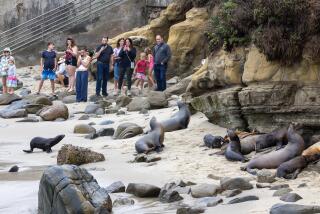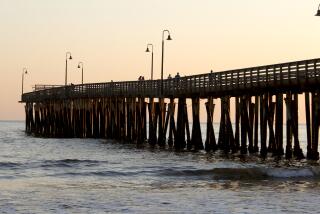Homeless Terns Block Project on Coronado Strand
Because a few pairs of shy little shore birds once nested on a manmade sandspit along the Coronado Strand, Joe Citron’s $85-million resort hotel and marina are still on the drawing boards.
Citron and his wife, Lenore, are Joelen Enterprises, and hold a lease on a 12.5-acre finger of land built with development in mind north of the posh residential marina, Coronado Cays. They plan to build a 450-room hotel on the land, complete with docks and boat slips, saunas and executive suites, restaurants, bars and convention facilities.
Over the years, they have accumulated permits and consent releases from a dozen governmental agencies, including the Coronado Planning Department and City Council, the San Diego Unified Port District and the state Coastal Commission. Even the residents of Coronado Cays, who initially were a bit upset at the thought of sharing their bayfront paradise with a bunch of well-heeled visitors, have made their peace with the newcomer.
Nesting Area Requirement
But no one thought to consult the original inhabitants of the homely little islet--the least tern. The Army Corps of Engineers has required that, for the project to go forward, 10 acres must be set aside for a nesting area for the endangered birds.
The U.S. Fish and Wildlife Service counted four to six pairs of the birds on the sandspit in the 1970s, but least terns have not been seen on the land for some time.
Citron, a 10-year resident of Coronado Cays, admits he is helpless to meet the environmental requirement. The hotel-marina, to be called Crown Isle Hilton, will take up every inch of the diamond-shaped site, and spread its pylons into the bay for over-the-water suites and meeting rooms, docks and boat slips.
So he went for help to his landlord, Coronado Landmark, which created Citron’s sandspit and the Coronado Cays real estate through bay dredging operations in 1969.
“We are ready to break ground on the first world-class waterfront resort hotel on the Pacific Coast,” Citron said--excluding the 100-year-old Hotel del Coronado four miles to the north as “a grand old lady without an equal”--as soon as someone finds a place for the least terns.
Port District officials say they have no part in the hunt for a home for the birds. Coronado Cays and Crown Isle land leases come directly from the state, not from the district itself, Port District spokesman Dan Wilkins said. The Port District also denied that a least tern habitat would be carved from any of its land around the bay, or from Emory Cove to the south of Coronado Cays, where a motley fleet of houseboats is about to be evicted.
The Harbor Patrol has orders to begin enforcing Port District anchorage rules starting on Saturday, and the live-aboards in Emory Cove are facing tickets and fines if they fail to move out of their safe harbor to an unprotected mid-bay anchorage designated as the only legal parking lot in the southern part of San Diego Bay.
The “mud ducks,” as the Emory Cove live-aboards are nicknamed, have heard rumors for over a year that they were being forced out of their scenic and safe anchorage “because of a hotel.” But no one could pin down anything concrete about the persistent rumor. Now the Emory Cove live-aboards are wondering if they are being ousted to make room for the Crown Isle least terns.
Agreement in the Offing
Donald Schultz, vice president in charge of real estate holdings for Signal Landmark, Coronado Landmark’s parent company, has the answer to their questions but, for now, isn’t talking.
Schultz said Thursday that he is in “final negotiations” for an interim least tern nesting site with a governmental entity. But, until the deal is signed, sealed and delivered, he said, he can’t disclose the parties involved or the details.
Meanwhile, Schultz voices his displeasure at the trouble that has been caused by a few least terns.
“It’s ludicrous,” he said of the conditions imposed on the Crown Isle development. “We created that land (Crown Isle), and just because four or six least terns landed there some time in the distant past, we have to go through all this. It’s a sad situation.”
More to Read
Sign up for Essential California
The most important California stories and recommendations in your inbox every morning.
You may occasionally receive promotional content from the Los Angeles Times.










